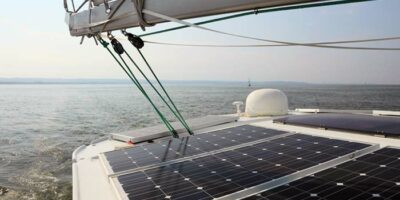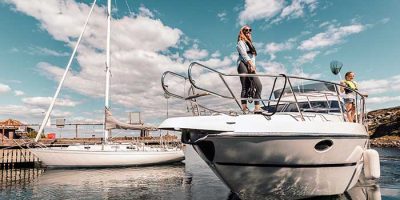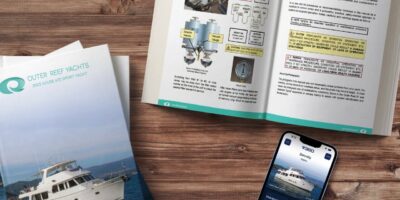Boat Winterizing Basics
Unless you're in the sunny South, Florida, or Hawaii, you'll almost certainly have to do at least some winterizing.
- January 29, 2024
The bad news about winterizing your boat is that if you forget something critical or you do something incorrectly, you may be faced with expensive repair bills and a long delay to get back on the water next spring. The good news is that most winterizing chores are not that hard, and we can show you how to avoid the vast majority of problems in a single page (though you’ll want to download our winterizing guide for a much more in-depth look). In a nutshell, winterizing means storing your boat properly, making sure engines and drives are protected, and making the plumbing freeze-proof.
Storage
The best place to store your boat is on land — winter storms or a failed thru-hull can’t sink a boat that’s not in the water. Cradles, jackstands, dry-stack storage, and trailers are your choices. Larger boats are usually stored ashore on jackstands. Make sure that the stands sit on plywood so they can’t sink and that they are chained together so they can’t slip away from the boat. If you store your boat on a trailer, you’ll extend the life of the tires if you take the load off of them with blocks. It also makes it harder to steal your boat.
If you decide to store in the water, your job is to prevent thru-hulls from allowing water in (close all but cockpit drains), be certain your bilge pump works well (test it by putting some water in the bilge and letting the float switch actuate), and make sure your boat is tied so strong winds can’t bang it against the dock (use long spring lines and have chafe guards on every line). Whether ashore or in the water, a well-fitting cover will prevent the cockpit from filling with water or ice during winter storms.
Once you’ve determined which method of storage works best for your boat, be sure to evaluate your boat insurance to make sure you’re fully covered. Be aware that many storage facilities don’t cover damage to your boat should a fire or roof collapse occur at the facility. Not all homeowner’s insurance policies will cover the boat while stored at the residence.
Getting The Water Out
Fun fact: When water freezes, it expands by almost 10 percent. Not-so-fun fact: If your raw-water cooling system holds, say, 10 quarts of water, when it freezes, there will suddenly be an extra quart inside under great pressure, with nowhere to go. It’s enough pressure to destroy a manifold, wreck a refrigerator, and even crack an engine block like an eggshell. The key, then, is to get water out of places where it will cause damage when it freezes.
Nearly all engines use raw water for at least some parts of the cooling system, and this water must either be drained or replaced with antifreeze. Mistakes in this step lead to the vast majority of the freeze claims in the BoatUS Marine Insurance files. Outboards can usually be drained easily simply by tilting the engine all the way down, but for inboards and I/Os the preferred method is to circulate antifreeze throughout the cooling system. Typically, a bucketful of antifreeze is sucked into the engine’s raw-water intake, replacing the water. Sea strainers need to be drained or filled with antifreeze too, because ice can crack them open and sink the boat during a thaw.
Other areas that have a risk of freezing water and need draining or antifreeze include the potable water system, air conditioning and refrigeration systems, marine heads and holding tanks, and bilge-pump systems (if your boat is stored out of the water).
Other Winterizing Tips
- Change the oil in the engine and sterndrive or lower unit before laying up — this prevents old, acidic oil from damaging internal parts.
- Fog gasoline engines to protect against internal rust.
- Fill gasoline tank and treat the fuel with stabilizer, or completely drain to ward off ethanol-induced issues and stale gas next spring.
- Flush outboards and store in lowest position to prevent water from remaining inside and freezing.
- Remove expensive electronics and fishing gear, and store at home to prevent damage or theft over winter.
- Don’t use a heater to winterize your boat. Not only will it prove useless right when you need it most (during a winter-storm power outage), there is a very real risk of fire.
- Visit your boat frequently to head off potential issues before they become serious.
Charles Fort
Contributing Editor, BoatUS Magazine
About Vessel Vanguard
Vessel Vanguard is a leading marine safety and maintenance management software provider dedicated to revolutionizing the maritime industry. With a commitment to innovation and excellence, Vessel Vanguard delivers cutting-edge solutions to streamline operations and enhance vessel performance and safety.
Latest Industry Insights

Embracing E-Boating Efficiencies

Boat Fuel Systems

The Future of Boats & Boating

Yacht Navigation Light Inspection
View All of Our Industry Insights
Navigate maritime with the latest news, practical how-to guides, insightful analyses and more.
